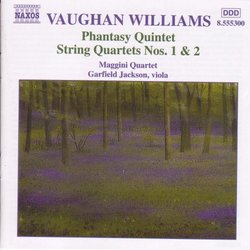| All Artists: Ralph Vaughan Williams, Garfield Jackson, Maggini Quartet Title: Vaughan Williams: Phantasy Quintet/String Quartets 1 & 2 Members Wishing: 0 Total Copies: 0 Label: Naxos Release Date: 5/15/2001 Genre: Classical Styles: Chamber Music, Historical Periods, Classical (c.1770-1830), Modern, 20th, & 21st Century Number of Discs: 1 SwapaCD Credits: 1 UPC: 747313530021 |
Search - Ralph Vaughan Williams, Garfield Jackson, Maggini Quartet :: Vaughan Williams: Phantasy Quintet/String Quartets 1 & 2
 | Ralph Vaughan Williams, Garfield Jackson, Maggini Quartet Vaughan Williams: Phantasy Quintet/String Quartets 1 & 2 Genre: Classical
|
Larger Image |
CD Details |
CD ReviewsThree wonderful works at a bargain price Rodney Gavin Bullock | Winchester, Hampshire Angleterre | 06/01/2001 (5 out of 5 stars) "If ever there was a piece of chamber music to send tingles down my spine, it is the opening Prelude of the Phantasy Quintet (1912). It has a yearning, ecstatic intensity which hints at something beyond ourselves. Then the delightful scherzo and lovely but short alla sarabanda. Finally the burlesca, starting with a cello theme like a group of heavy-footed Morris men not sure of their steps but becoming fleeter and more delicate. A Lark Ascending-type violin solo leads to a beautiful conclusion. The Magginis play this wonderful quintet quite beautifully.When VW started his first string quartet (1908, rev 1921), he had completed a period of study with Ravel and it is easy to discern the French influence. Although all the elements of his mature style - folk song, the English Tudor composers and French impressionism - were within him, they still had a while to simmer and blend, so this work is not fully characteristic. The Maggini Quartet take the Minuet and Trio a bit slower than usual but it still sounds right. The lovely Romance is played very tenderly, giving more emphasis to the more impassioned passages. The finale is again taken on the slow-ish side but it comes off just the same. The extraordinary ending, with the violin sliding down from the stratosphere, brings the piece to an end.Written during the Second World War, the second string quartet (1942-3) enters a very different world. Composed between the sublime 5th symphony and the bleak 6th, its emotional world is more akin to the latter. VW wrote it as a birthday present for his friend, Jean Stewart, who was a violist. This instrument has a very important part in all four movements and in the scherzo, it is the only one that is unmuted. The prelude and scherzo are both tense emotionally though the first is most troubled. The romance has a bitter-sweet lyricism with a wonderful episode in which the viola and violin melodies twine round each other. The epilogue is based on a lyrical though sad melody and brings this outstanding work to a serene end. The Maggini Quartet give a fine performance, managing to sound ferocious when needed but treat the tender passages with a loving touch.This disc represents outstanding value with performances which stand comparison with anyone. The recording is good with lots of detail. The notes are accurate but a bit po-faced: the ecstatic prelude to the quintet is described thus, 'The first viola starts [it] with thematic material of pentatonic outline, to be answered by the first violin. The viola ends the movement...' Hardly imbued with passion!" A True Winner at a Bargain Price David Dennis | San Mateo, CA | 10/29/2001 (5 out of 5 stars) "'Gramophone''s "Chamber Music of the Year" award winner for 2001...and at such a bargain price! Whether you're familiar with Vaughan Williams, or just curious, this is a delightful, safe buy. One of Naxos' best disks, ever. Highly recommended." Wonderful Introduction to Vaughan Williams' Chamber Music Lawrence A. Schenbeck | Atlanta, GA USA | 07/31/2005 (5 out of 5 stars) "Gorgeous pieces with very direct appeal, and very finely performed. The spirit of English folk music -- ballads *and* dances -- pervades much of this disc. Ralph Vaughan Williams's characteristic blend of modal harmony and simple, straightforward melody (both of which owe something to folksong) is much in evidence here. In addition, the influence of VW's studies with Ravel can be felt in the two earlier works on this CD, the Phantasie and First Quartet.
As an homage to Renaissance English works for consorts of viols, this Phantasie never reaches self-consciously for archaic gestures. Its fairly short movements instead opt for alternating dreamy and dance-like moods, with just a bit of counterpoint thrown in occasionally. The extra viola affords a chance for richer textures and nice contrasts: just listen to the evocative opening measures, in which a plaintive solo viola is answered by ethereal sustained chords from the other players. Absolutely captivating. The First Quartet, written about the same time, has a similar style but longer and more formally worked-out movements. So VW can approach more ardent romanticism in the slow movement -- there's time to build to a real climax or two. The Second Quartet, from the early 1940s, is more astringent and dramatic, probably reflecting the anxieties of the war years. This is a terrific recording technically as well. It manages to achieve intimacy without the sense of microphones having been shoved in the performers' faces (or fingerboards). Vibrant, rich sounds. If you enjoyed this, try the EMI reissue of another Vaughan Williams work, "An Oxford Elegy," which offers a similar combination of controlled but deeply felt emotion within an English pastoral "landscape" (here imagined, there invoked more directly)." |

 Track Listings (12) - Disc #1
Track Listings (12) - Disc #1